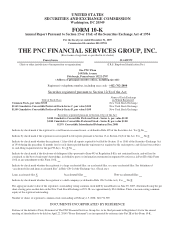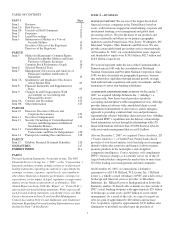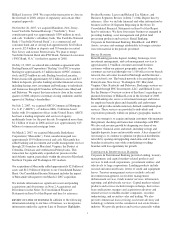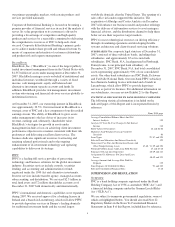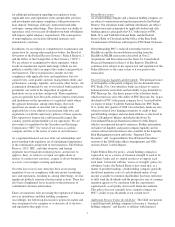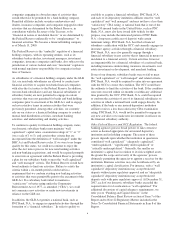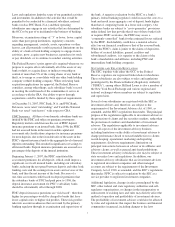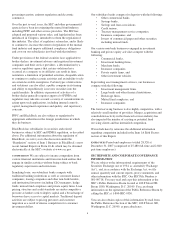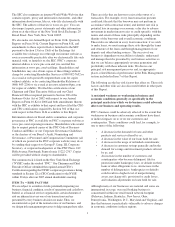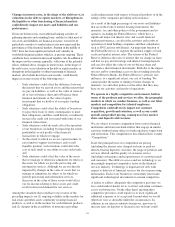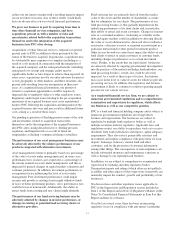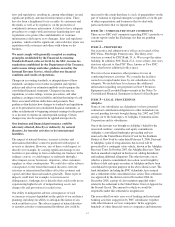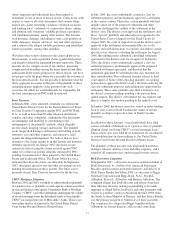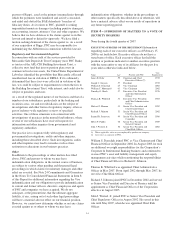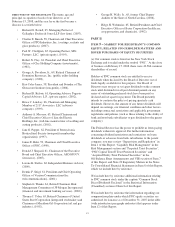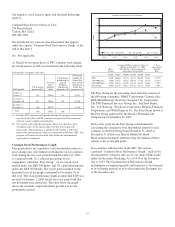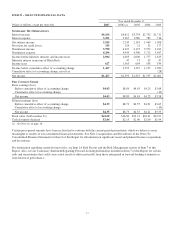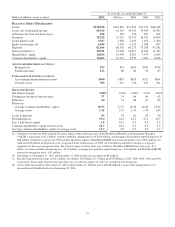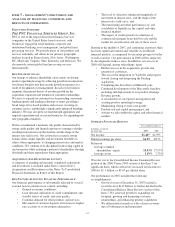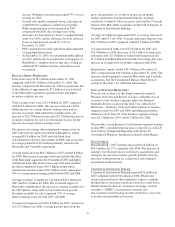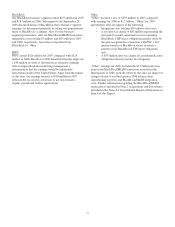PNC Bank 2007 Annual Report Download - page 16
Download and view the complete annual report
Please find page 16 of the 2007 PNC Bank annual report below. You can navigate through the pages in the report by either clicking on the pages listed below, or by using the keyword search tool below to find specific information within the annual report.reduce our net interest margin with a resulting negative impact
on our net interest income. Any of these results would likely
have an adverse effect on our overall financial performance.
We grow our business in part by acquiring from time to
time other financial services companies, and these
acquisitions present us with a number of risks and
uncertainties related both to the acquisition transactions
themselves and to the integration of the acquired
businesses into PNC after closing.
Acquisitions of other financial services companies in general
present risks to PNC in addition to those presented by the
nature of the business acquired. In particular, acquisitions may
be substantially more expensive to complete (including as a
result of costs incurred in connection with the integration of
the acquired company) and the anticipated benefits (including
anticipated cost savings and strategic gains) may be
significantly harder or take longer to achieve than expected. In
some cases, acquisitions involve our entry into new businesses
or new geographic or other markets, and these situations also
present risks resulting from our inexperience in these new
areas. As a regulated financial institution, our pursuit of
attractive acquisition opportunities could be negatively
impacted due to regulatory delays or other regulatory issues.
Regulatory and/or legal issues relating to the pre-acquisition
operations of an acquired business may cause reputational
harm to PNC following the acquisition and integration of the
acquired business into ours and may result in additional future
costs arising as a result of those issues.
Our pending acquisition of Sterling presents many of the risks
and uncertainties related to acquisition transactions
themselves and to the integration of the acquired businesses
into PNC after closing described above. Sterling presents
regulatory and litigation risk as a result of financial
irregularities at Sterling’s commercial finance subsidiary.
The performance of our asset management businesses may
be adversely affected by the relative performance of our
products compared with alternative investments.
Asset management revenue is primarily based on a percentage
of the value of assets under management and, in some cases,
performance fees, in most cases expressed as a percentage of
the returns realized on assets under management, and thus is
impacted by general changes in capital markets valuations and
customer preferences. In addition, investment performance is
an important factor influencing the level of assets under
management. Poor investment performance could impair
revenue and growth as existing clients might withdraw funds
in favor of better performing products. Also, performance fees
could be lower or nonexistent. Additionally, the ability to
attract funds from existing and new clients might diminish.
The performance of our fund servicing business may be
adversely affected by changes in investor preferences, or
changes in existing or potential fund servicing clients or
alternative providers.
Fund servicing fees are primarily derived from the market
value of the assets and the number of shareholder accounts
that we administer for our clients. The performance of our
fund processing business is thus partially dependent on the
underlying performance of its fund clients and, in particular,
their ability to attract and retain customers. Changes in interest
rates or a sustained weakness, weakening or volatility in the
debt and equity markets could (in addition to affecting directly
the value of assets administered as discussed above) influence
an investor’s decision to invest or maintain an investment in a
particular mutual fund or other pooled investment product.
Other factors beyond our control may impact the ability of our
fund clients to attract or retain customers or customer funds,
including changes in preferences as to certain investment
styles. Further, to the extent that our fund clients’ businesses
are adversely affected by ongoing governmental investigations
into the practices of the mutual and hedge fund industries, our
fund processing business’ results also could be adversely
impacted. As a result of these types of factors, fluctuations
may occur in the level or value of assets for which we provide
processing services. In addition, this regulatory and business
environment is likely to continue to result in operating margin
pressure for our various services.
As a regulated financial services firm, we are subject to
numerous governmental regulations and to comprehensive
examination and supervision by regulators, which affects
our business as well as our competitive position.
PNC is a bank and financial holding company and is subject to
numerous governmental regulations involving both its
business and organization. Our businesses are subject to
regulation by multiple bank regulatory bodies as well as
multiple securities industry regulators. Applicable laws and
regulations restrict our ability to repurchase stock or to receive
dividends from bank subsidiaries and impose capital adequacy
requirements. They also restrict permissible activities and
investments and require compliance with protections for loan,
deposit, brokerage, fiduciary, mutual fund and other
customers, and for the protection of customer information,
among other things. The consequences of noncompliance can
include substantial monetary and nonmonetary sanctions as
well as damage to our reputation and business.
In addition, we are subject to comprehensive examination and
supervision by banking and other regulatory bodies.
Examination reports and ratings (which often are not publicly
available) and other aspects of this supervisory framework can
materially impact the conduct, growth, and profitability of our
businesses.
We discuss these and other regulatory issues applicable to
PNC in the Supervision and Regulation section included in
Item 1 of this Report and in Note 22 Regulatory Matters in the
Notes To Consolidated Financial Statements in Item 8 of this
Report and here by reference.
Over the last several years, there has been an increasing
regulatory focus on compliance with anti-money laundering
11


